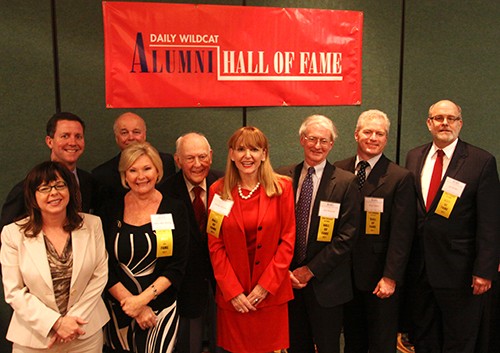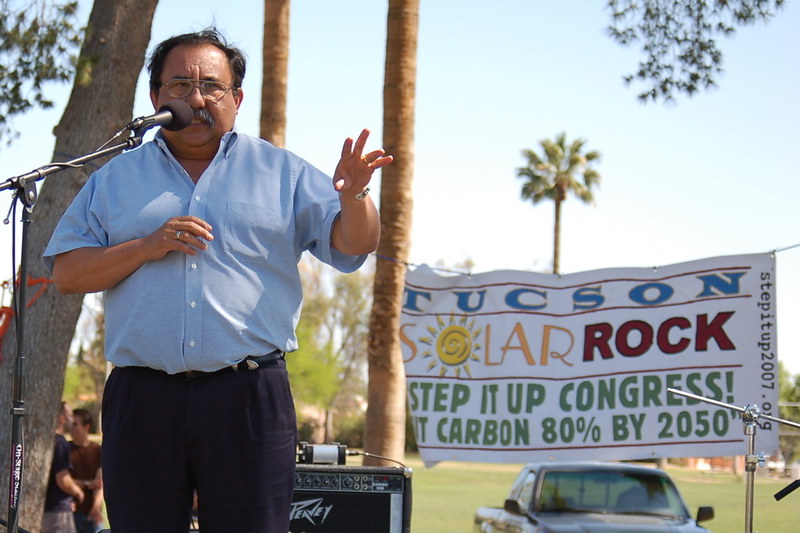The Arizona Daily Wildcat inducted 13 new members into its Alumni Hall of Fame at the Tucson Marriott University Park Hotel on Saturday.
This newest batch of inductees includes a Pulitzer Prize winner, lawyers, public relations and communication officials, entrepreneurs, a thoroughbred racehorse trainer, and reporters from a wide array of fields.
Each honoree gave a speech, and the common themes were reflection on past Wildcat experiences and encouragement to young journalists entering the field during a time of industry flux.
“”I think journalism is much more important now then ever precisely because the field is changing. Now anyone with a laptop can blog and pretend they’re a reporter,”” said Mary Kellogg, a travel writer, author and media consultant.
Kellogg said that readers would soon become more astute at identifying which news sources they can trust.
“”The need for journalists is going to grow,”” she said. “”I think people are going to recognize that.””
Sheila McNulty, an energy reporter for the Financial Times, said that specialization is important as a readership or audience becomes more interested in niche topics.
“”That’s the one thing I’ve learned over the years,”” she said, “”you’ve got to have something specific to offer because there are millions of people out there looking for journalism jobs.””
Margo Warren, branch chief of the Health Education and Public Liaison Section in the Office of Communications and public liaison at the National Institute of Neurological Disorders and Stroke, part of the National Institutes of Health, said that honing writing and important skills is becoming more important as print outlets consolidate.
“”Although there may not be as many jobs in print journalism as there once were, the world will always need good writers,”” she said.
Morgan Loew, an investigative reporter for KPHO in Phoenix, said that, contrary to popular belief, the journalism field isn’t dying but rather becoming more exciting as technology changes.
“”This is still a fantastic field and the future is not bleak,”” he said. “”The future is wide open for it.””
Loew said he has friends who are lawyers or doctors, but feels like journalism is a more rewarding field than either.
“”None of them have been in a war zone with missiles flying overhead,”” he said. “”None of them have had a hidden camera where you’re negotiating with a smuggler. None of them have been able to do what I’ve been able to do and I wouldn’t trade that for anything or for any salary.””
Jay Parker, a professor of International Security at the College of International Security Affairs of the National Defense University in Washington, D.C., agreed that as the field changes, there are more opportunities, not less.
“”Sometimes people get too caught up in the traditional expectations of what sorts of avenues they should use and don’t realize there are many ways to do the job,”” he said. “”The possibilities are virtually limitless.””
Parker praised the Wildcat for making him passionate about journalism.
“”At a very young age I had my dream job, and I’ve been trying to replicate it or top it ever since,”” he said.
Bob Crawford, an editor at The Arizona Republic, said journalists need to try and move away from the 24-hour news cycle and the emphasis on always being the first to get the story.
“”My first advice would be to be accurate and be quick,”” he said. “”If you can’t get it right then don’t bother with getting it first. Getting it right is a lot more important than getting it first and I don’t think in the Internet age everyone understands that.””
The Wildcat also confered 10 Young Alumni awards to more recent UA graduates. Some of these graduates include Ryan Gabrielson, who collaborated with Paul Giblin, a Hall of Fame inductee this year, to win the Pulitzer Prize for local reporting in 2009. Other Young Alumni Award winners include Maxx Wolfson, the field editor for Getty Images, Nate Olivarez-Giles and Nicole Santa Cruz, both reporters at the Los Angeles Times, and Daniel Scarpinato, who is the communications director for the Arizona Republican legislative majority.








